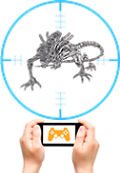OVERVIEWPhase 1The collection of smart phones carried by people can be used for large scale sensing of the physical world by leveraging the cameras, microphones, GPSs, accelerometers, and other sensors on the phones. In order to verify that smartphone sensing is scalable, reliable, and cost-effective, we built and deployed McSense platform. For campus students to participate in the research study, McSense app is provided in Android market (download). Phase 2Serious games can be applied to solve interesting computer science problems. The purpose of this research is to understand the player's involvement, behavioral patterns and strategies while playing the location-based serious game. In order to verify that the serious games are scalable, reliable, and cost-effective to solve interesting problems, we built and deployed mobile game in Android platform. For campus students to participate in the research study, game is provided in Android market. (download). RESEARCH DIRECTIONSPhase 1 - Crowdsensing using the micro-paymentsThe main goal of this research is to set the course for mass adoption and automation of mobile people-centric sensing. We believe that mobile crowd sensing (i.e., crowd-sourced mobile sensing) with micro-payments
represents the right approach to achieve this goal, but are aware that many challenges have to be overcome to
make the vision reality. We plan to systematically explore the benefits and challenges of this people-centric
sensing paradigm. Phase 2 - Mobile crowdsensing gameThe main goals of the crowdsensing game user study are 1) to determine whether the mobile users are interested in playing the mobile crowdsensing games and 2) to compare the area coverage efficiency in mobile crowdsensing games vs crowdsensing using the micro-payments. The WiFi area coverage maps for the McSense user study and the Alien vs. Mobile User game study in first 2-week period can be viewed from below links. McSense WiFi Map Game WiFi Map The overall WiFi area coverage map for the McSense user study can be viewed from below link. Overall McSense WiFi Map The overall WiFi area coverage maps for the Alien vs. Mobile User game study can be viewed from below link. Overall Game WiFi Map PUBLICATIONS
FACULTY (Phase 1 & 2)
Cristian Borcea Ph.D. STUDENT (Phase 1 & 2)Manoop Talasila Ph.D. Candidate Department of Computer Science New Jersey Institute of Technology VISITING STUDENT (Phase 1)Claudio Pellizzari Visiting MS Student University of Bologna COLLABORATORS (Phase 1)Faculty: Antonio Corradi (Full Professor at University of Bologna) Paolo Bellavista (Associate Professor at University of Bologna) Luca Foschini (Assistant Professor at University of Bologna) Ph.D. student: Giuseppe Cardone (University of Bologna) |
 Phase 1 - Crowdsensing using micro-payments  Phase 2 - Crowdsensing game |
McSenseSense the world |
 |